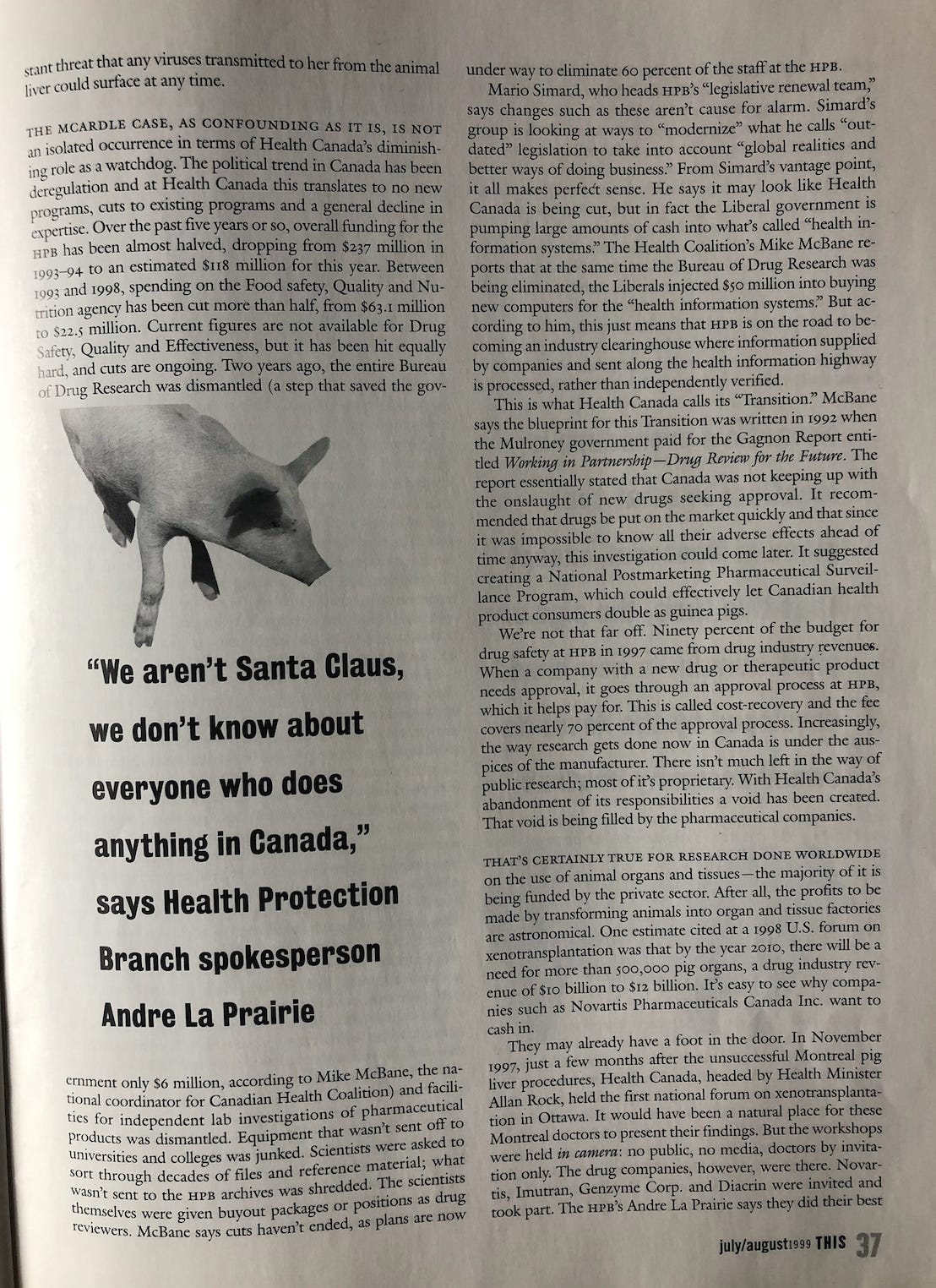From the Archive: "This Little Piggy's Going to Market"
How the continued deregulation of Canada's health environment is placing Canadians in harm's way
“This Little Piggy’s Going to Market” is from my archive of past articles. It was the cover story in the 1999 summer issue of THIS Magazine. The magazine nominated it for a National Magazine Award in the Science/ Medical category. I’m posting it here because it’s still very relevant in terms of Canada’s deregulated health environment. When I wrote the article, Health Canada’s diminishing role as a watchdog was new. There were cuts to existing programs, no new programs, and a general decline in expertise. Two years before the article was published, the entire Bureau of Drug Research and facilities for independent lab investigations of pharmaceutical products was dismantled. The gory details are in the article below. Suffice it to say here, that this process of deregulation has continued incrementally over the last two decades, so that today, Health Canada is a shadow of its former self.
In fact, if it wasn’t for industry fees, Health Canada’s regulatory ability likely wouldn’t exist at all.
According to Health Canada’s Mark Johnson, fees paid by industry to Health Canada for the scientific review of human drugs accounts for 75% of the costs to run the department. In an email correspondence Johnson writes:
"Health Canada is responsible for regulating the safety, efficacy and quality of therapeutic products. The Department charges fees to industry to recover a portion of the costs of some of its regulatory activities. This is consistent with the approach taken by other international regulators. Of note, regulatory reviews are rigorous, science-based and independent, and fees are paid irrespective of whether or not a drug or medical device is authorized. The fees charged to industry were updated in 2020 after extensive consultations (2017-2018) as they were eight years out of date. Based on industry feedback (in 2018), fees for the scientific review of human drugs were set at 75% of costs (down from the originally proposed 90%), delayed by one year, and are being implemented gradually up to 2024. This transition period allows industry time to adjust."
So, if 75% of the cost of regulating is paid for by the industries being regulated, do you really think public interest is the government’s first and foremost concern? It should also be noted that the neoliberal trend of deregulating the health environment has been occurring in many countries across the globe simultaneously, and raises legitimate concerns about whether drugs and therapeutics are being sufficiently tested before being marketed.
The COVID-19 mRNA products are a case in point.
Peter Doshi is a pharmacy professor at the University of Maryland School of Pharmacy, and senior editor at the British Medical Journal. He and others re-analyzed the clinical trial data and published a study that appeared in 2022 in the journal Vaccine. These data were not made public when the vaccines were first authorized and deployed. It was only through a court order in response to a Freedom of Information request by a group of doctors and scientists, including Doshi, that the US Food and Drug Administration was ordered to release the 450,000 pages of data it relied on to license Pfizer’s vaccine. The US government wanted to review and release 500 pages a month, which would have taken 75 years to complete.
After re-analysis, Doshi says the Pfizer and Moderna data show a combined 1 in 800 chance of having a Serious Adverse Event (SAE), which the companies define as landing you in hospital. Doshi says this is vastly higher than other vaccines that have an elevated risk of a SAE of about 1 or 2 per million vaccinated.
In an interview, Doshi says that from the beginning, public health officials presented the public with a “picture of great certainty” about the products but the “reality is there were extremely important unknowns at the time of the mass deployment and authorization at the end of 2020.” He says that “as a result of presenting certainty instead of uncertainty, the stakes became too high to later present the uncertainty to people, because how could you be uncertain later about something you were certain about? Uncertainty should reduce over time, not increase.”
“That set us off on the wrong foot. From the beginning public health officials should have been a lot more forthright about the gaps in our knowledge.”
In my view, that people were not informed of the potential risks of significantly elevated SAEs associated with the vaccines, and not presented with the highly relevant age-stratified harm/ benefit analysis necessary for individuals to give informed consent, is indicative and illustrative of the growing dangers of a deregulated health environment.
Doshi also notes that despite his efforts to get media coverage of the re-analysis of the clinical trial data that he and his colleagues published in 2022, it was not reported on in the mainstream/ corporate press, so the public is “not getting the information we need about understanding risk and benefit and making informed decisions.”
With that, here is my 1999 article. It lays out some of the pitfalls of placing the fox in charge of the henhouse, but in this case, it involves pigs.










